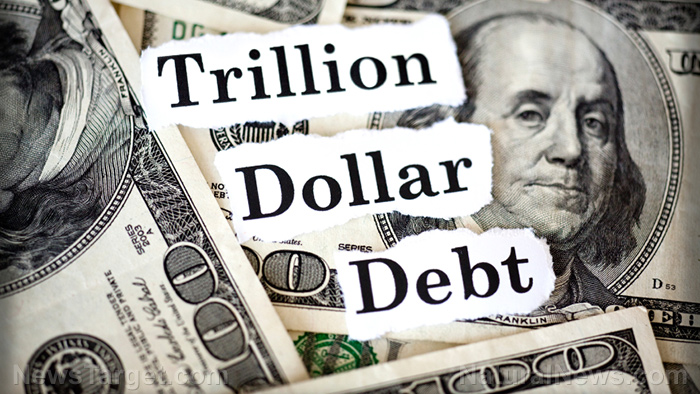
Data shows that China increased its debt by $2.5 trillion in the first quarter, while the United States added another $1.5 trillion. Meanwhile, the total debt in the Eurozone declined for a third consecutive quarter.
According to analysis, both emerging and developed countries are entering a monetary tightening cycle with high levels of dollar-denominated debt. As central banks move forward with tightening policies to curb inflationary pressures, higher borrowing costs will exacerbate debt vulnerabilities, severely impacting emerging market borrowers with a less diversified investor base.
Corporate debts outside of banks and government borrowing were also the largest sources of the increase. Debt, excluding the financial sector, surged above $236 trillion, which is $40 trillion higher than two years ago when the Wuhan coronavirus (COVID-19) pandemic began.
The pandemic has worsened a debt crisis that has been brewing since the 2008 global recession. According to the International Monetary Fund (IMF), at least 100 countries need to reduce expenditures on health, education and social protection. Around 30 countries in the developing world have high levels of debt distress, which means they're experiencing great difficulty in servicing their debts.
Government financing needs are still running well above pre-pandemic levels. Higher and more volatile commodity prices could force them to increase public spending even further to ward off social unrest. This could be particularly difficult for emerging markets with less fiscal space.
Growth is also expected to slow in 2022, which could lead to adverse implications for debt dynamics. With the strict lockdowns in China and tighter global funding conditions, the anticipated slowdown will also likely limit or reverse the downward trend in debt ratios.
Crisis results in wider global inequity
The crisis hit poor and middle-income countries harder than rich countries because wealthier ones are borrowing to launch fiscal stimulus packages while low and middle-income countries cannot afford such measures, resulting in wider global inequity.
Moreover, the large debt increase was justified as governments struggled to protect lives, preserve jobs and avoid a wave of bankruptcies during the COVID-19 pandemic. If the governments had not taken action, the social and economic consequences would have been devastating.
However, this amplifies vulnerabilities, especially as the financing conditions tighten. High debt levels usually constrain the ability of governments to support the recovery and the capacity of the private sector to invest medium-term.
Another challenge is to strike the right mix of fiscal and monetary policies in an environment of high debt and rising inflation. Fiscal and monetary policies complemented each other during the pandemic. Central bank actions, especially in advanced economies pushed the interest rates down to their limit and made it easier for governments to borrow.
Monetary policy is appropriately shifting focus to rising inflation and inflation expectations. While an increase in inflation and nominal GDP helps reduce debt ratios in some cases, it is unlikely to sustain the significant decline in debt. As central banks raise interest rates to prevent high inflation, borrowing costs also rise.
In emerging markets, policy rates have already increased and further rises are expected. Central banks are also planning to reduce large purchases of government debt and other assets in advanced economies. How this is carried out will have implications for economic recoveries and fiscal policies. (Related: Ongoing Russia-Ukraine conflict pushing global economy closer to collapse.)
Interest rates are also rising, which means fiscal policies need to adjust, especially in countries with higher debt vulnerabilities. Historically, fiscal support becomes less effective when interest rates respond. Higher spending or lower taxes will have less impact on economic activity and employment could fuel inflation pressures. However, debt sustainability concerns are still likely to intensify.
The risks will also be magnified if global interest rates rise faster than expected while growth falters. Tightening financial conditions would heighten the pressure on the most indebted governments, households and firms. If public and private sectors are forced to deleverage, their growth prospects will also suffer.
The uncertain outlook and vulnerabilities in the economy make it critical to achieve the right balance of policy flexibility, adjustment to changing circumstances and commitment to credible and sustainable medium-term fiscal plans. These strategies could both reduce debt vulnerabilities and help central banks contain inflation. (Related: Governments on road to collapse as global supply chain crisis, inflation worsen; Sri Lanka now suspending foreign debt payments.)
Some countries, especially those with high gross financing needs or exposure to exchange rate vitality, may need to adjust faster to preserve market confidence and prevent more fiscal distress. The pandemic and the global financing divide now demand strong, effective international cooperation and support to developing countries.
Follow DebtCollapse.com for more stories about finance and economics.
Watch the video below to learn how the soaring global debt could trigger the next financial crisis.
This video is from the Chinese taking down EVIL CCP channel on Brighteon.com.
More related stories:
More states sign up for national vaccine pass as Ukraine-Russia conflict distracts Americans.
Sources include:
Please contact us for more information.


















